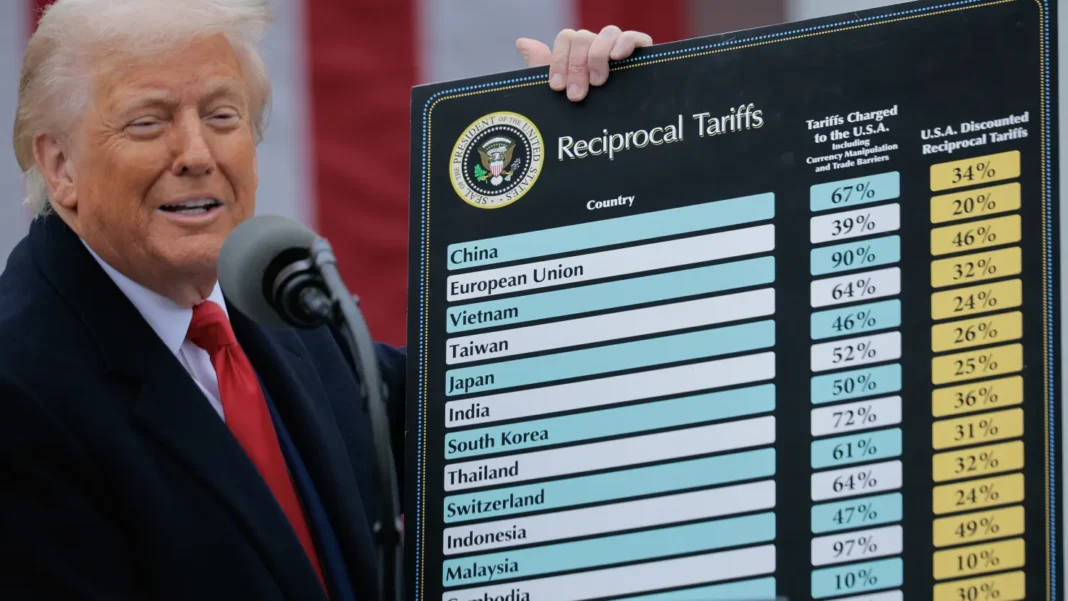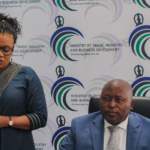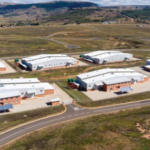Bereng Mpaki
Lesotho is gradually moving away from the United States (US) market towards regional African trade as uncertainty grows over American tariffs and trade agreements.
The shift comes as JEE Clothing, a Maputsoe-based workwear manufacturer, expands operations to employ 250 additional workers, bringing its workforce from 632 to over 850.
JEE’s expansion was recently launched under the government’s “Re Bula Lifeme” campaign, led by the Lesotho National Development Corporation (LNDC). The campaign aims to revitalise Lesotho’s economy by reopening and expanding factories, thereby creating jobs and reducing unemployment.
Since the campaign launched in 2024, several factories, in particular those exporting within the African continent, have expanded their operations and increased their workforce, while some have resumed operations after previously running into significant market challenges.
Mokhethi Shelile, the Minister of Trade, Industry and Business Development, said that given the growing challenges faced by Lesotho-based manufacturers in exporting to the United States (US), the government has resolved to shift its focus to alternative markets, particularly within the African region.
Speaking on the sidelines of the recent official launch of JEE’s expansion, Shelile emphasised the importance of reducing exports to the US amid the uncertainty surrounding future US-Lesotho trade relations despite the ongoing discussions around reciprocal tariffs.
His comments come in the wake of US President Donald Trump’s executive order earlier this year, which imposed a new 50 percent import tariff on goods from Lesotho. The implementation of the tariffs has been deferred to August 2025.
As a result of this unfavourable trade development, some manufacturers operating in Lesotho have responded by downsizing their operations while exploring alternative regions for investment.
Among such manufacturers is Maseru E-Textile, which in June this year laid off about 1000 workers due to diminished orders from its US buyers, as the uncertainty about the tariffs ominously hangs over Lesotho’s textile and clothing industry.
Compounding the situation, Lesotho is also facing uncertainty regarding the renewal of the African Growth and Opportunity Act (AGOA), a key US trade concession that expires in September 2025. Lesotho’s textile sector has long relied on AGOA, with the US historically being the largest export market for its garments.
In April this year, Shelile warned that the failure to renew AGOA would have disastrous consequences, as there are currently 11 manufacturers in Lesotho directly servicing the US market and employing over 12,000 Basotho workers.
According to the Bureau of Statistics’ (BoS) foreign trade report for the first quarter of 2025, 62.6 percent of Lesotho’s exports were destined for South Africa, while only 19.8 percent went to the US.
“It is becoming difficult to trade with the US at the moment,” Shelile said in Maputsoe last Friday.
“We as the government have done our part in engaging the US on tariff negotiations, and we are still awaiting their positive response,” he added, noting that the regional market is more appealing due to its proximity to Lesotho and the resulting lower logistical costs.
“We must therefore decrease the rate of exporting to the US and export more to the regional market, like the factory we are launching today.”
He believes that with the government’s new plan to diversify markets away from the US, Lesotho can revive its struggling textile sector and create more jobs, as it once did in the past.
“We will get back up from where Mr Trump has thrown us. We will not perish without him,” Shelile insisted.
Since the Covid-19 pandemic, Lesotho’s textile sector has endured devastating job losses, with close to 30,000 positions lost in recent years.
Echoing Shelile’s sentiments, LNDC interim CEO Molise Ramaili said that the current market challenges have pushed Lesotho to explore alternative destinations, with South Africa’s 60 million-strong population offering strong market potential.
Ramaili also pointed to opportunities across the African continent, which Lesotho hopes to tap into through the African Continental Free Trade Area (AfCFTA) agreement. He added that they would soon open another Maputsoe-based factory to generate about 600 new jobs.
Veteran trade unionist Bahlakoana Lebakae has urged the government to intensify efforts to attract foreign investors into the country. He believes that developing a national strategy to industrialise Lesotho requires the involvement of a broad range of stakeholders with diverse expertise.
He expressed concern over the government’s public celebration of job creation numbers that pale in comparison to the scale of losses already sustained in the sector.
“It is concerning to see the Minister appear on national television announcing 250 jobs when tens of thousands have already been lost in the textile sector.
“The government must develop a holistic approach that brings together different stakeholders to chart the way forward in finding new markets for Lesotho. We need to involve academia, economists, and trade unionists alike. If we can put the interests of the masses ahead of our own, meaningful progress can be achieved,” Lebakae said.
Summary
- Mokhethi Shelile, the Minister of Trade, Industry and Business Development, said that given the growing challenges faced by Lesotho-based manufacturers in exporting to the United States (US), the government has resolved to shift its focus to alternative markets, particularly within the African region.
- Speaking on the sidelines of the recent official launch of JEE’s expansion, Shelile emphasised the importance of reducing exports to the US amid the uncertainty surrounding future US-Lesotho trade relations despite the ongoing discussions around reciprocal tariffs.
- “We as the government have done our part in engaging the US on tariff negotiations, and we are still awaiting their positive response,” he added, noting that the regional market is more appealing due to its proximity to Lesotho and the resulting lower logistical costs.

Your Trusted Source for News and Insights in Lesotho!
At Newsday Media, we are passionate about delivering accurate, timely, and engaging news and multimedia content to our diverse audience. Founded with the vision of revolutionizing the media landscape in Lesotho, we have grown into a leading hybrid media company that blends traditional journalism with innovative digital platforms.










